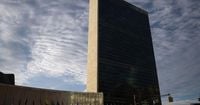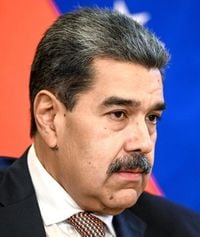At the United Nations headquarters in New York on October 10, 2025, tensions reached a boiling point as the United States and Venezuela squared off in an emergency Security Council meeting. The cause? A series of deadly U.S. military strikes on boats in the Caribbean, which Washington insists were drug-running vessels, but which Caracas and its allies decry as the opening salvos of a looming war.
The meeting was called at Venezuela’s request, following a month of escalating military actions by the Trump administration. According to Associated Press, the U.S. strikes killed 21 people, with three of the targeted boats reportedly setting out from Venezuela. The U.S. has recently amassed a formidable force in the Caribbean: eight warships, a nuclear-powered submarine, several P-8 surveillance planes, 4,000 to 10,000 troops, and F-35 fighter jets stationed in Puerto Rico. This military buildup, described by many as unprecedented, has raised alarm bells throughout the region and at the United Nations.
Venezuela’s U.N. Ambassador Samuel Moncada minced no words, warning the Security Council, "The belligerent action and rhetoric of the U.S. government objectively point to the fact that we are facing a situation in which it is rational to anticipate that in the very short term, an armed attack is to be perpetrated against Venezuela." Moncada urged the Council to take measures to prevent further escalation and to reaffirm respect for Venezuela’s sovereignty and territorial integrity. However, with the United States holding veto power, few expected any concrete action from the body.
Backing Venezuela were Russia and China, both of whom criticized the U.S. actions as dangerous and destabilizing. Russia’s U.N. Ambassador Vassily Nebenzia stated, "Venezuela has been subjected to unprecedented pressure and threats of military invasion," and warned that the large-scale U.S. military activity off Venezuela’s coast threatened international peace and security. Most other Council members, including France, called for de-escalation and adherence to international law, with France’s deputy ambassador Jay Dharmadhikari emphasizing that "the fight against drug trafficking must also respect international human rights law and states must refrain from any unilateral armed initiative action."
Notably absent from the meeting were the U.S. Ambassador and deputy; instead, Political Counselor John Kelley delivered the Trump administration’s justification. He reiterated the administration’s stance that President Trump would use "the full power of America, and the full might of the United States, to take on and eradicate these drug cartels, no matter where they’re operating from and no matter how long they have been able to act with impunity." Kelley insisted that the U.S. is acting in self-defense under the U.N. Charter, declaring the nation in a "non-international armed conflict" with drug cartels deemed terrorist organizations by the administration.
This legal rationale is fiercely contested. According to CNN, the Trump administration has prepared a classified legal opinion that "appears to justify an open-ended war against a secret list of groups, giving the president power to designate drug traffickers as enemy combatants and have them summarily killed." Critics, including legal experts and lawmakers, argue that such actions bypass due process and violate both U.S. and international law. Sarah Harrison, a senior analyst at Crisis Group, told CNN, "It would mean DOJ has interpreted the president to have such extraordinary powers that he alone can decide to prosecute a war far broader than what Congress authorized after the attacks on 9/11."
The roots of this crisis stretch back months. Diplomatic outreach between the U.S. and Venezuela, led by special envoy Richard Grenell, had been the main channel for avoiding open conflict. But in early October 2025, President Trump abruptly ordered an end to these talks, frustrated by Venezuelan President Nicolás Maduro’s refusal to step down and his denials of involvement in narcotrafficking. The Trump administration alleges that Maduro and top officials head the Cartel de los Soles, a group it designated a terrorist organization earlier in the year. Maduro, for his part, has repeatedly denied these accusations, citing U.N. data to claim an "impeccable record in the fight against international drug trafficking." In a letter to Trump, he wrote, "This and other matters will always be open for direct and frank discussion with your special envoy Grenell, so that we can overcome media noise and fake news." But with hardliners like Secretary of State Marco Rubio pushing for regime change, the diplomatic window slammed shut.
The U.S. military actions have not been without controversy. The first airstrike on September 2, 2025, killed 11 people identified as fishermen off the coast of Venezuela, according to reports cited by regional leaders. Colombian President Gustavo Petro further complicated matters by announcing that the fourth bombed boat was a Colombian vessel, accusing Trump of "opening a war scenario" in the region. While the Trump administration denied the vessel’s Colombian identity, a U.S. official confirmed Colombian citizens were on board, as reported by the New York Times. The victims of the strikes remain largely unidentified and untried, with the U.S. branding them as narcotraffickers without presenting evidence.
Domestically, the legality of the strikes has come under scrutiny. Senate Democrats attempted to limit Trump’s authority to conduct such operations under the War Powers Act, but their bill was blocked by a Republican majority on October 9, 2025. This effectively left the president with broad leeway to continue military actions without Congressional oversight. As NBC News reported, the Trump administration’s goal appears to be to pressure Maduro into making rash decisions that could lead to his ouster, all "without American boots on the ground."
Meanwhile, Venezuela has responded with both diplomacy and mobilization. On October 6, Maduro announced that Venezuelan security forces had foiled a "false flag" plot to bomb the U.S. embassy in Caracas, vowing to reinforce security measures despite "all the differences we have had with the governments of the United States." In a show of national resolve, Venezuela mobilized its Bolivarian National Militia, with 8 million additional volunteers joining after enlistment campaigns, raising the total force to over 12 million civilian combatants, according to the government. Maduro declared, "That oil, that gas, that gold, this land, and this people will continue to belong to Venezuelans. And we will never allow our homeland to be violated or touched. Never!"
Despite the saber-rattling, polls indicate that only 16% of Americans support military intervention in Venezuela. Yet, on October 5, Trump openly threatened possible land strikes, stating, "We’ll have to start looking about the land because they’ll be forced to go by land," during an event at Naval Station Norfolk. Reports from NBC News suggest that the Pentagon has already drawn up plans for drone strikes within Venezuelan territory, though the White House has yet to approve such operations.
As the world watches, the standoff between the U.S. and Venezuela teeters on the edge of wider conflict. With diplomatic channels shuttered, legal justifications stretched, and military forces massed, the coming weeks will test the resolve and restraint of both nations—and the international community’s ability to prevent a regional catastrophe.


